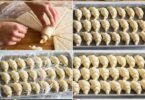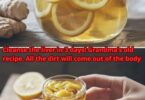This is the only version I’ll eat now!
In a world where convenience often trumps tradition, my Nana remains a beacon of old-school wisdom. She has a knack for turning simple ingredients into delicious, wholesome meals. One of her best-kept secrets? Homemade cheese.
Nana insists it’s not only 10 times cheaper than store-bought cheese but also significantly healthier. Intrigued by her claim, I decided to dive into the process and benefits of making cheese at home. What I discovered was eye-opening, and I’m here to share it with you.
The Economics of Homemade Cheese
Let’s start with the cost. Cheese can be expensive, especially high-quality, organic, or specialty cheeses. A pound of cheese can easily set you back $8 to $20, depending on the type. On the other hand, the ingredients for homemade cheese are minimal and inexpensive. All you really need is milk, an acid like lemon juice or vinegar, and salt.
For example, a gallon of milk (which can cost around $3 to $5) yields approximately one pound of cheese. The other ingredients cost mere cents. When you do the math, it’s easy to see how Nana’s claim that homemade cheese is 10 times cheaper holds water. Over time, the savings really add up, especially if you’re a regular cheese consumer.
The Health Benefits of Homemade Cheese
Beyond cost, Nana is a firm believer in the health benefits of homemade cheese. Here’s why:
Control Over Ingredients: When you make cheese at home, you have complete control over what goes into it. Commercial cheeses often contain additives, preservatives, and artificial flavors. By making it yourself, you avoid unnecessary chemicals and additives, which is particularly important for people with food sensitivities or those trying to eat clean.
Fresher and More Nutritious: Homemade cheese is incredibly fresh, and because it’s unprocessed, it retains more of the natural nutrients found in milk, such as calcium and protein. Fresh cheese also has a rich, creamy taste that’s hard to beat.
Lower Sodium: Store-bought cheeses can be loaded with salt to enhance flavor and prolong shelf life. By making your own, you can control the amount of salt, making it a healthier option, particularly for those monitoring their sodium intake.
Probiotic Potential: If you venture into making cultured cheeses like yogurt cheese or ricotta, you can benefit from the probiotics they contain, which are great for gut health.
The Process: How to Make Homemade Cheese
Making cheese at home may sound daunting, but Nana’s method is simple and straightforward. Here’s a basic recipe to get you started:
Ingredients:
1 gallon of whole milk (preferably organic and not ultra-pasteurized)
1/4 cup lemon juice or white vinegar
Salt to taste
1/4 cup lemon juice or white vinegar
Salt to taste
Instructions:
continued on next page
ADVERTISEMENT







